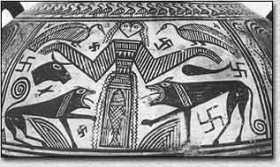
The nature of supernovas explained. A new farm that raises fish debuts. And we discuss the value of preserving particular words. It's Earthy Thursday, our weekly segment on science and Earth-related news. All this and more for the Pagan News Beagle!
 PaganSquare.com - WitchesAndPagans.com
PaganSquare.com - WitchesAndPagans.com PaganSquare is a community blog space where Pagans can discuss topics relevant to the life and spiritual practice of all Pagans.

Some Southern Pagans, have criticized comments I made elsewhere on W&P and on Patheos supporting removing the Confederacy’s battle flag from all public displays in the South. They thought I unfairly maligned Southern culture by saying it was inextricable from racism. Some thought I must not know anything about the South. For the record I was born in Southwest Virginia, raised in the half-Southern state of Kansas with relatives whose views ranged from a relatively benign racism to endorsing Southern slavery. For much of my life I frequently visited my Virginia and Arkansas relatives. I am not a Southerner, but I have fairly substantial experience with Southern culture, usually in a positive context. That experience plus their defense of the Confederacy's battle flag as a symbol of Southern culture has led to this post, dedicated to Southern Pagans.
...
Today our FieryTuesday Pagan News Beagle celebrates the untold stories of overcoming oppression on this Irish heritage day. Irish slaves; real Irish history; Choctaw aid to Ireland; Irish emigrant letters; African American wins St Patrick's day essay contest.
Before the African slave trade to the Americas became institutionalized, another oppressed group provided slave labor (labeled "indentured servitude") for European colonization of the continent. Guess who? The Irish.
...
Anti-choice advocates claim the ethical high ground. They continually use language such as “pro-life,” call a fetus a “baby,” and proclaim their devotion to the well-being of the unborn. They contrast this with the heartlessness of ‘choice.’ Even when we disagree it is tempting to treat them as acting in good faith.
...A few days ago, I got into an interesting discussion with PaganSquare founder Anne about Hellenismos in general and slavery in particular. The discussion focussed on what should and should not be part of Recon practice and slavery, obviously, was one of the things we both thought had no place in it. I realized, though, that not everyone may know what slavery entailed in ancient Greece and the many difference there are between the ancient Greek form of slavery and the modern history version of the same practice.